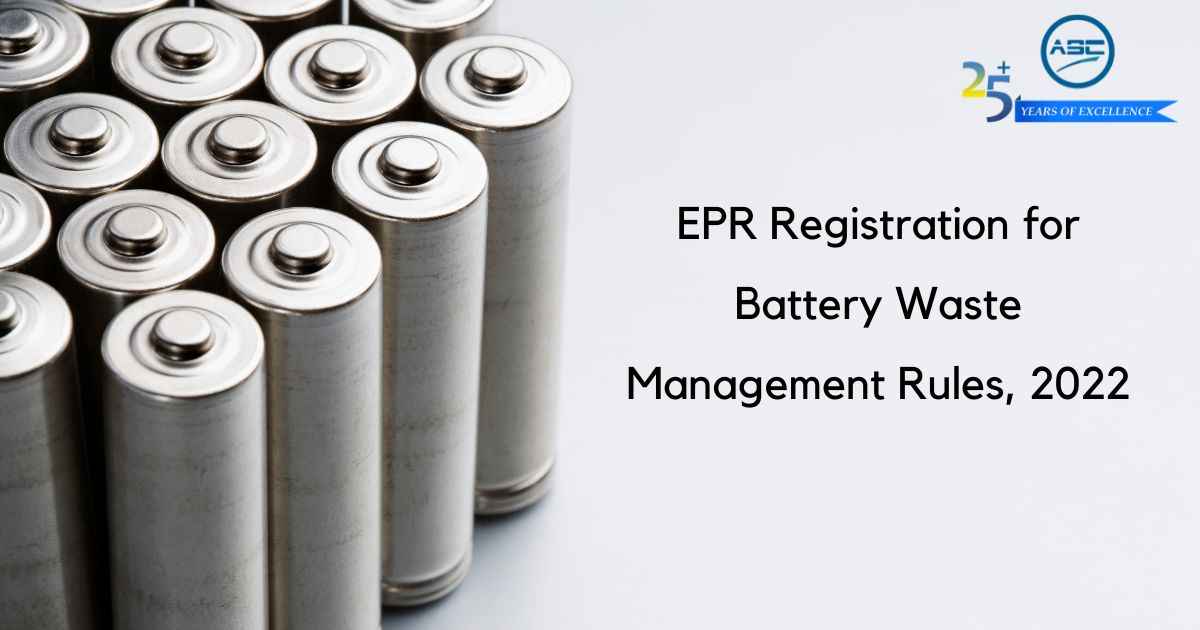


With the advent of electronic vehicles and the rising use of electric batteries, the Ministry of Environment, Forest and Climate Change has issued a notification launching “Battery Waste Management Rules, 2022”. These rules replaced the Batteries (Management and Handling) Rules, 2001. What are the new rules about batteries and is EPR registration for battery waste mandatory?
All the producers, manufacturers, traders, dealers, consumers, assemblers and other establishments that are involved in the collection, segregation, reprocessing, transportation and recycling of waste batteries shall be governed by these rules. Extended Producer Responsibility (EPR) plays an important role in this regard. It places responsibility on the producers, including importers, for proper management of the waste products. In the case of battery waste management, EPR holds producers and importers responsible for refurbishing, recycling and collection of waste batteries.
The Battery Waste Management Rules, 2022 broadly lays down as to what should be included in waste batteries. Following are the batteries that should be categorised as waste batteries:
It includes all the categories of batteries like electric vehicle batteries, automotive batteries, portable batteries and industrial batteries.
Following are the EPR responsibilities under battery waste management rules, 2022:
The following are the notable effects of EPR for battery waste management rules:
The new battery waste management rules have placed responsibility on the producers for the purpose of making arrangements for the restoration, collection and recycling of the used batteries. The EPR targets vary according to the type of batteries including lead-acid batteries, lithium-ion batteries etc. Further, the act also requires a certain minimal use of recycled battery components like nickel, lithium and cobalt for producing new batteries.
Our finance minister Nirmala Sitharaman presented a future strategy in the Budget 2023 for batteries used in the electric vehicles. The introduction of battery swap policy encouraged the private sector for sustainable development. It promoted the ‘Battery as a Service’ model that not only enhanced the usage of electric vehicles but also fostered a beneficial and sustainable ecosystem. This policy was introduced keeping in mind the lack of space in the urban areas for meeting the charging needs of electric vehicles.
In order to standardise and ensure effective implementation of the battery waste management rules in India, the CPCB (Central Pollution Control Board) has implemented a centralised portal for the purpose of registration and submission of the battery waste returns. This portal will also facilitate the generation and exchange of EPR certification by recyclers, producers and refurbishers.
Following are some of the key responsibilities placed on the producers, manufacturers, importers and refurbishers:
The new Battery Waste Management Rules, 2022 is an environmentally friendly and key legislation to ensure that we move from oil to electric in a sustainable and eco-friendly manner. By placing EPR registration for battery waste requirements, it ensures that those dealing with electric batteries ensure proper environmentally friendly behaviour. Producers, recyclers as well as refurbishers need to ensure that they adhere to all the EPR compliances for battery waste. In case you need any assistance in relation to battery waste EPR registration and compliances, feel free to contact the ASC Group.
Also Read:
EPR Registration Rules for Plastic Waste Management
New Rules for EPR E-waste Management 2022-23
























































Leave a Reply
Your email address will not be published. Required fields are marked *